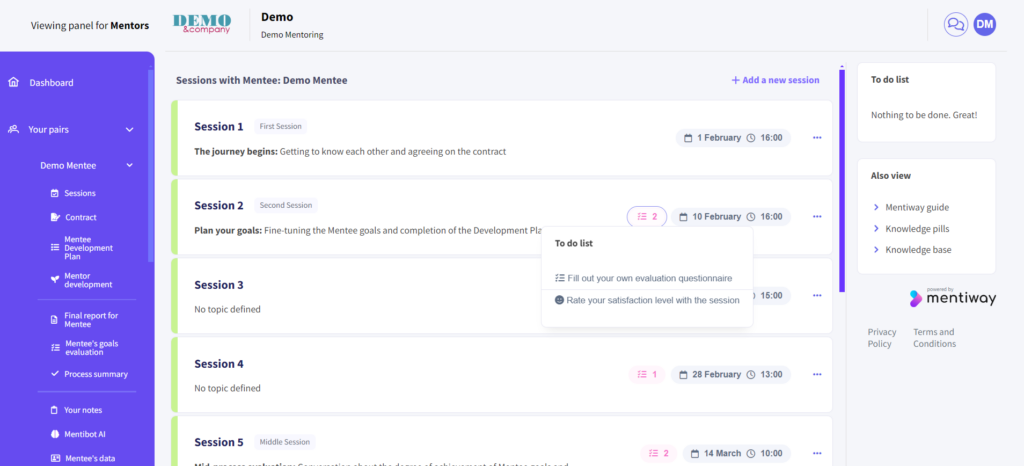Homework in mentoring – tasks for Mentee between sessions
Mentoring is a unique form of development. The very relationship that builds over the duration of the process is something that distinguishes mentoring from other training methods. In addition, the processes are individual in nature, tailored to the needs of the Mentee, extended over time, taking into account changing needs.
But the element that distinguishes mentoring from other forms of improvement is also homework – tasks / projects completed by the Mentee between mentoring sessions. In this article I will present the advantages of this work, show examples and tell how homework is implemented in the Mentiway platform.
Mentee’s own work in mentoring
Tasks completed between sessions (commonly referred to as homework or self-work) play an important role in mentoring processes and are definitely something worth doing in pairs.
First of all, homework in this form allows to maintain continuity of development. It ensures that the Mentee takes an active part in the mentoring process not only during the sessions, or just before them – preparing, but also in the longer periods between meetings. Typically, mentoring sessions are implemented every 2-4 weeks. This time can be long enough for the Mentee to “forget” what they worked on with the Mentor during the session. Working on your own helps prevent this from happening. It ensures continuity of development.
In addition, working between sessions also increases efficiency of development and introduces an element of practice. Through homework, the Mentee has the opportunity to practice or test in real situations what was discussed during the meeting with the Mentor. This naturally improves the effectiveness of the mentoring process. The Mentee learns faster and in a more effective way.
Ultimately, the work between sessions and its implementation is also an important subject on which the Mentor can provide feedback. When discussing the results of the work, the Mentee not only evaluates the results himself/herself and has an opportunity for self-reflection, but can also expect constructive feedback from the Mentor/Mentee. This is an opportunity to further deepen your work and share your own knowledge from a more experienced colleague.
This also makes the results of the homework an excellent topic for starting subsequent mentoring sessions. The couple can discuss the results of the work at the beginning of the meeting and then seamlessly move on to the next topic of the current session.
Homework vs. Mentee’s daily responsibilities
In addition to the above-mentioned benefits, homework in mentoring also has the advantage that it can be in naturally integrated into the Mentee’s daily routine.
Mentoring usually addresses the areas that the Mentee is pursuing on a daily basis. The mentee’s short-term goals very often correspond to the goal of the mentoring process. As a result, completing homework can usually happen while doing daily chores.
For example, if the goal of the process is to improve sales skills, and the Mentee implements these sales activities in his/her daily work, then the homework can address various practical issues related to these activities. This could be, for example, applying selected techniques, paying attention to feedback, to one’s own feelings or spoken words.
As a result, homework not only does not place an undue burden on Mentee, but directly contributes to practical application and improved efficiency of daily operations.
Examples of homework in mentoring
Self-work in mentoring depends on the Mentee’s current session topics and goals. It is impossible to identify examples of tasks that are most commonly used. Nevertheless, to illustrate what such tasks may look like I have prepared some examples below.
- Mentoring session topic: Knowing your strengths
Homework example: Gather feedback from co-workers on your own strengths . - Mentoring session topic: Giving constructive feedback
Homework example: Apply the FUKO model in several cases, collect and write down your thoughts about these situations and the effectiveness of using this model in practice. - Mentoring session topic: Improving the efficiency of daily work
Homework example: Test the application of the Eisenhower matrix technique in prioritizing tasks. Analyze and reflect on its effectiveness and applicability in daily work. .
Own work for Mentor
It is worth noting here that in addition to the tasks carried out by the Mentee, the Mentor also has its “homework” tasks.
This usually simply refers to preparing for each successive session.
Knowing the topic of the next meeting, the Mentor(s) should prepare accordingly by reflecting on and organizing their previous knowledge and experience on the topic. Sometimes such preparation requires going back to or finding new source materials, reviewing them and summarizing them for the next session.
Mentiway  homework module;

Homework has huge benefits and is an integral part of any mentoring process. At Mentiway, we place great emphasis on putting them into practice. To this end, we have introduced a dedicated module at the level of each session for scheduling homework and recommend its use in session agendas or email reminders, among other things.
In addition, to broaden the perspective, we have also introduced a homework module to the Mentibot AI functionality. After introducing a session topic, the artificial intelligence will suggest some suggestions for related work to be completed before the next meeting. Sometimes it’s useful to look at things from the side – even from an AI perspective.
Hi, my name is Thomas. I am the Co-Founder of Mentiway. We are happy to share our knowledge and support organisations on their way to success! 💪 If you are interested in how to efficiently and effectively implement a mentoring programme in your organisation using technology:








